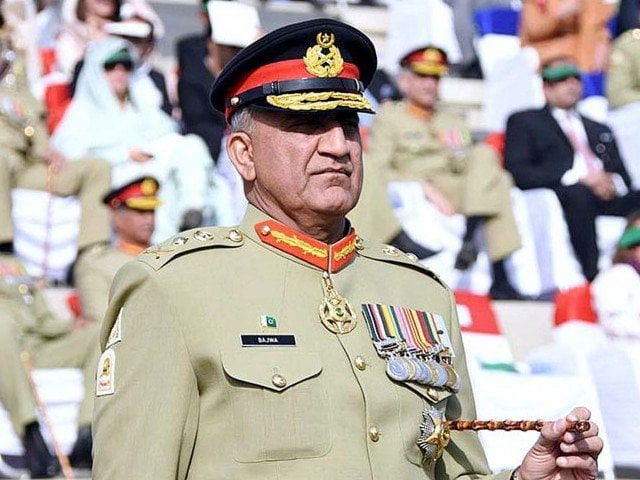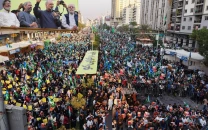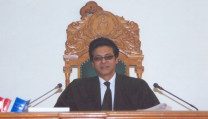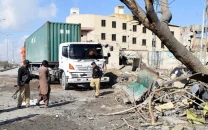Verbal duel: Gen Qamar fires broadside at Indian counterpart
Says military is fully geared to respond to enemy aggression.

Army chief General Qamar Javed Bajwa
But newly appointed Indian army chief Bipin Rawat’s latest statement about the so-called surgical strikes has ignited a fresh debate and war of words between the two nuclear-armed neighbours.
In his first direct statement aimed at India, army chief General Qamar Javed Bajwa on Thursday dismissed claims by his Indian counterpart about the so-called surgical strikes, calling his assertion ‘self-defeating.’
Army chief rejects India's 'self defeating' surgical strike claims
“Pakistan’s Armed Forces are fully geared to respond to any aggression by India,” Gen Qamar was quoted as saying by Director General Inter-Services Public Relations (ISPR) Major General Asif Ghafoor.
Gen Qamar rejected self-defeating claims made by the Indian army chief about the ‘so-called surgical strikes’ and their possible recurrence, the chief military spokesperson added in a tweet on the micro-blogging website Twitter.

His reaction came in response to an interview by the Indian army chief in which he said the so-called surgical strikes last year were meant to deliver a message to Pakistan. Gen Rawat, who recently took over as the Indian army chief, then went on to say that the possibility of a similar action in future could not be ruled out.
India claimed to have carried out surgical strikes across the Line of Control (LoC) in September last year to target the alleged ‘terror launch pads.’ The alleged strikes were carried out in response to an attack on its military headquarters in Uri in disputed Kashmir in which at least 19 Indian soldiers were killed. New Delhi blamed Pakistan-based Jaish-e-Muhammad for the attack.
Pakistan, however, rubbished the claims and the military’s media wing took an unprecedented step to take a convoy of local and international journalists to the front line at the LoC to rebut Indian claims of surgical strikes.
Since the change of command in the Pakistani and Indian armies, there has been dramatic reduction in the number of skirmishes between the two countries along the LoC. There were even reports that the two neighbours might de-escalate the situation.
But the Indian army chief’s assertion on the so-called surgical strikes and strong rebuttal by his Pakistani counterpart suggested that the situation is still tense.
The current tension between the two nuclear-tipped neighbours is rooted in the ongoing uprising in Indian controlled Kashmir that has been seething with violence since July when prominent Kashmir leader Burhan Wani was killed.
Can’t rule out more ‘surgical strikes’ against Pakistan: Indian Army chief
Pakistan believes that the Indian claims of so-called surgical strikes, coupled with upping the ante along the border, are aimed at diverting global attention away from the uprising in Kashmir.
India is also upset with Pakistan’s relentless campaign to highlight grave human rights violations being committed by Indian forces in the Himalayan region.
Optimising Balochistan’s geo-strategic location
In a veiled reference to India, Gen Qamar earlier in the day also said that the country’s enemies have since long been trying to spark unrest and instability in the province but added that the resilient nation has fought and defeated their designs.
“Today’s Balochistan is stronger, integrated and on its way to recovery,” the COAS said adding that the development of the Gwadar port, construction of the 870 km road infrastructure and realisation of China-Pakistan Economic Corridor(CPEC) was testimony of Pakistan’s national resolve.
The army chief stressed that Pakistan needed to remain focused in its vision of connecting the region and even beyond, for economic growth and prosperity.
“For this, the prerequisite is to optimise Balochistan’s geo-strategic location and galvanise enormous human and natural resource potential,” he said. This is only possible, the COAS said, when the external and internal challenges are dealt with properly. He said that the external challenges emanate from perceived geopolitical divergences and competing interests while internal threats were “our own shortcomings exploited and fuelled by our enemies to take us away from the path of progress”.
He pointed out that connectivity was not just about bringing places closer but was also about binding people through the bond of shared development and prosperity. “The network of development projects envisioned under CPEC will put Balochistan at the heart of the national development effort”.
“If we manage to stay committed to this vision, we will be connected, not only with China, Central Asia and Africa but also with other important economies of the world,” he said, adding that these developments will transform Balochistan into a vibrant model of development for the entire region and beyond.
While this undertaking has added to the security demands in the short term, its success will comprehensively enhance national security in the long term, he said.
Addressing a seminar organised by Balochistan University of Engineering and Technology, Khuzdar, the COAS said the Pakistan Army has been making efforts to secure the ongoing developmental activity in the province.
“Over the past few years, Pakistan Army and other law enforcement agencies, with full support of the people of Balochistan have contributed immensely to shape the environment for undertaking this vital national project. Today, Alhamdulillah positive results are in front of everyone,” he said.
He added that the army was contributing significantly to bringing Balochistan into the mainstream. “Nearly 20,000 sons of Balochistan are serving in the army, including 603 officers. At this very moment, 232 cadets are undergoing training at the PMA”.
“Allah willing, that day is not very far, when one of you will be standing at my place and talking to the youth of this great province”, the COAS said.
He placed his trust in “the highly capable, bright and patriotic youth of Balochistan”.
“I have no doubt you understand that your future lies in a well-educated and developed Balochistan and Pakistan. I am happy that Balochistan’s youth has convincingly chosen peace and prosperity as their future,” he added.
He assured the army’s commitment to peace, stability and development of Balochistan. “It is our promise that we will develop every part of Balochistan, come what may, Inshallah.”
Most Pakistanis in favour of dialogue with India, reveals survey
He said that the army will leave no stone unturned to ensure due role of the people of the province.
“Balochistan is the heart of Pakistan; success of Pakistan is enshrined in stability and development of Balochistan. Let us jointly work towards that end,” he concluded.
Addressing the seminar, Balochistan Chief Minister Nawab Sanaullah Khan Zehri said that CPEC was a game changer not only for Pakistan but for the entire region.
He said that following the construction of CPEC roads, the second largest city of Balochistan Khuzdar would become a hub for trade activities. (With additional input from APP)
Published in The Express Tribune, January 6th, 2017.



















COMMENTS
Comments are moderated and generally will be posted if they are on-topic and not abusive.
For more information, please see our Comments FAQ